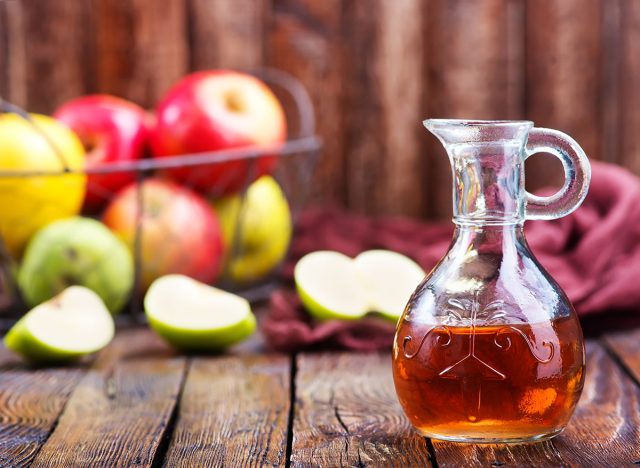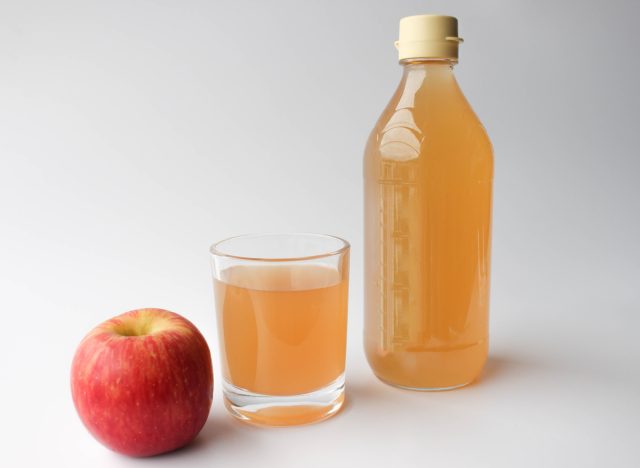Along with kale, quinoa, and kombucha, apple cider vinegar is up there as one of the trendiest health foods over the last decade—and it’s easy to see why. Studies have linked ACV with all kinds of potential benefits, including weight loss and reduced belly fat, and lower blood sugar levels. Some of these benefits may be tied to the fact that apple cider vinegar contains a substance called the “mother,” which is a byproduct of friendly bacteria and yeast that contains proteins and enzymes. As it’s known for its antimicrobial and antioxidant properties, cultures around the world have used ACV for centuries in medicine.
But it is indeed possible to have too much of a good thing, and that’s certainly true with this popular health drink.
While this particular vinegar is safe for most people to consume in moderate amounts, overdoing it could lead to some unpleasant consequences.
“How much ACV to drink is still up to debate,” says Juliana Tamayo, RDN, an editor for Fitness Clone. “Some people take 1-2 tablespoons diluted in water to aid with weight loss and reduce appetite. For all other benefits, such as helping manage blood sugar and improve gut microbiota, 1 tablespoon in water should be enough.”
ACV isn’t for everyone and can affect people differently depending on their health and other factors. So, before you go adding it to your daily diet, make sure to talk to your doctor—and be aware of these surprising side effects of drinking too much apple cider vinegar.

According to Trista Best, RD, a dietitian with Balance One Supplements, ACV is meant to heal your gut—at least in small doses.
“Apple cider vinegar may help repair or correct many gastrointestinal issues because of its antimicrobial, antiviral, antifungal, prebiotic, and probiotic characteristics,” says Best.
However, overloading on ACV may cause an upset stomach or indigestion.
“When you drink too much—more than 2 tablespoons—it can begin to interact with the absorption of other nutrients,” explains Tamayo. “This causes food to sit in your stomach for hours and delays gastric emptying. In extreme cases, that leads to gastroparesis, which can lead to bloating, indigestion, nausea, vomiting, and more. This is particularly true for patients with type 1 diabetes who are more at risk for gastroparesis.”
If you experience any of these symptoms, Tamayo recommends reducing your intake to 1-2 tablespoons per day and consulting your doctor.



Apple cider vinegar contains 5-6% acetic acid, and according to Whitney Stuart, RDN, this acid can gradually erode the enamel on your teeth because of its low pH level, which is a measure of how acidic something is. The lower the pH, the higher the concentration of acid.
Enamel protects your teeth from damage. So, if excessive consumption of ACV starts to damage your enamel, Stuart says you might notice sensitivity to hot and cold drinks and foods, or even yellowing of your teeth.
In a 2014 study published in Clinical Laboratory, enamel from human wisdom teeth that were immersed in low-pH kinds of vinegar experienced a 1–20% loss of minerals after four hours.
In order to protect your teeth, Stuart highly recommends diluting your ACV with a 1:1 ratio of water before drinking it.



Many people with acid reflux experience symptoms after having acidic foods and beverages—and ACV definitely fits the bill.
“Consuming apple cider vinegar can make your acid reflux worse by causing further heartburn,” says Stuart.
This is especially true if you drink it undiluted in large quantities.
Also, note that if you currently have an ulcer, apple cider vinegar is best avoided as it can further aggravate it and hinder the healing process.



Potassium is a pretty important mineral: this electrolyte helps keep your heartbeat regular, your nerves functioning properly, and your muscles contracting as they should. It can also counteract the negative impact of sodium on your blood pressure, and have a positive effect on bone mineral density by neutralizing acid and reducing calcium loss from bone.
However, Tamayo says that ACV may negatively impact how well your body absorbs certain minerals—especially potassium.
In an older case study, a young woman was admitted to the hospital with low potassium levels, and diagnosed with osteoporosis—which was attributed to her excessive ACV consumption. The subject had been consuming eight ounces of apple cider vinegar daily for six years, and doctors believed that drinking it in these large doses caused important minerals to be leached from her bones.



There are two reasons why drinking too much apple cider vinegar can cause a burning sensation in your throat. For one, as has been established, it’s a super acidic substance that can be quite irritating when consumed in large amounts. But also, when ACV triggers acid reflux, that causes stomach acid to flow back into the esophagus, which tends to cause a burning feeling.
In fact, an older review examined what happens when children accidentally swallow certain liquids and found acetic acid from vinegar was the most common cause of throat burns.





